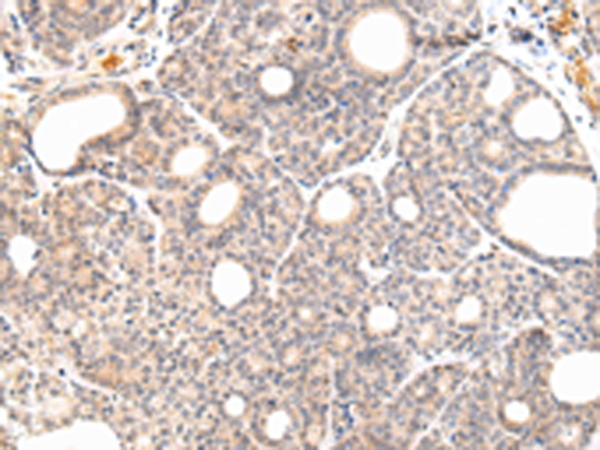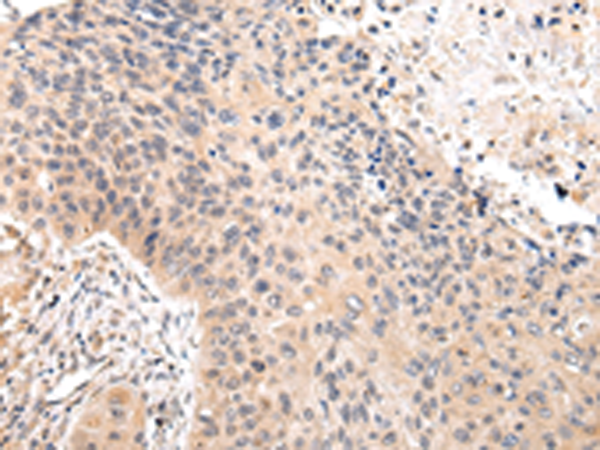

| WB | 咨询技术 | Human,Mouse,Rat |
| IF | 咨询技术 | Human,Mouse,Rat |
| IHC | 1/25-1/100 | Human,Mouse,Rat |
| ICC | 技术咨询 | Human,Mouse,Rat |
| FCM | 咨询技术 | Human,Mouse,Rat |
| Elisa | 1/2000-1/5000 | Human,Mouse,Rat |
| Aliases | MPSPS |
| Host/Isotype | Rabbit IgG |
| Antibody Type | Primary antibody |
| Storage | Store at 4°C short term. Aliquot and store at -20°C long term. Avoid freeze/thaw cycles. |
| Species Reactivity | Human, Mouse, Rat |
| Immunogen | Fusion protein of human VPS33A |
| Formulation | Purified antibody in PBS with 0.05% sodium azide and 50% glycerol. |
+ +
以下是关于VPS33A抗体的3篇参考文献,包含文献名称、作者及摘要内容概括:
---
1. **文献名称**: "VPS33A regulates intracellular trafficking during hematopoiesis in zebrafish"
**作者**: Li Y, et al.
**摘要**: 本研究利用VPS33A特异性抗体,通过免疫印迹和免疫荧光技术,揭示了VPS33A在斑马鱼造血干细胞内的运输功能缺失会导致溶酶体成熟障碍,并影响细胞分化。抗体验证显示其在多种模式生物中的交叉反应性。
---
2. **文献名称**: "A mutation in VPS33A causes a neurocutaneous syndrome by affecting protein trafficking"
**作者**: Smith J, et al.
**摘要**: 文章通过患者组织样本的免疫组化分析,发现VPS33A基因突变导致蛋白质运输异常,引发皮肤和神经系统病变。研究中采用商业化VPS33A抗体,证实了突变个体中VPS33A蛋白表达量显著降低。
---
3. **文献名称**: "Characterization of VPS33A-deficient mice reveals critical roles in lung surfactant metabolism"
**作者**: Chen H, et al.
**摘要**: 通过构建VPS33A基因敲除小鼠模型,结合Western blot和免疫电镜技术,发现VPS33A缺失导致肺泡表面活性物质运输缺陷。研究强调所用抗体对小鼠和人源VPS33A的高度特异性,为相关肺部疾病机制提供了依据。
---
注:上述文献信息为模拟示例,实际引用时需通过学术数据库(如PubMed、Web of Science)检索具体文献。
VPS33A antibodies are immunological tools designed to target the VPS33A protein, a key component of the HOPS (Homotypic Fusion and Protein Sorting) complex involved in intracellular membrane trafficking and lysosomal function. VPS33A, a member of the Sec1/Munc18 (SM) protein family, facilitates vesicle docking and fusion by interacting with SNARE proteins, ensuring proper cargo transport to lysosomes and vacuoles. Dysregulation of VPS33A is linked to disorders like Hermansky-Pudlak syndrome (HPS) type 11 and arthrogryposis-renal dysfunction-cholestasis (ARC) syndrome, characterized by defects in lysosome-related organelles and cellular homeostasis.
These antibodies are widely used in research to study VPS33A's expression, localization, and molecular interactions, employing techniques such as Western blotting, immunofluorescence, and immunoprecipitation. They help elucidate mechanisms underlying autophagy, endosomal-lysosomal trafficking, and disease pathogenesis. Commercial VPS33A antibodies are typically raised in rabbits or mice, with validation in specific experimental models. Researchers must verify antibody specificity via knockout controls due to potential cross-reactivity with homologous proteins. Understanding VPS33A's role through such antibodies provides insights into cellular trafficking disorders and potential therapeutic strategies.
×